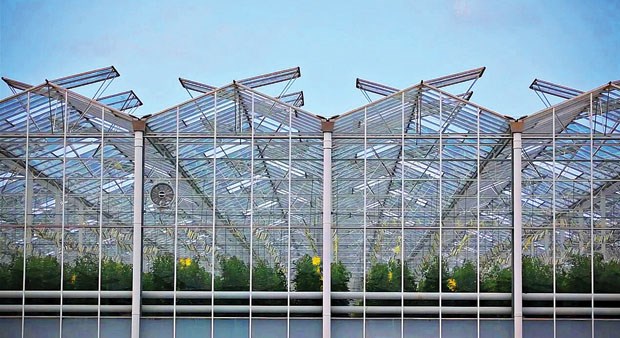It’s an overwhelming challenge to stay profitable growing greenhouse vegetables, according to Village Farms International which is turning to a more profitable harvest.
In an interview with the Optimist, founder Michael DeGiglio, who has served as CEO since the company’s inception in 1987, discussed some of the reasoning behind his company’s decision to begin converting its huge East Ladner greenhouse operation to cannabis production.
“You look at this payroll tax they [the provincial government] will implement and then you look at things like the carbon tax, and then the payroll is going up, so it’s becoming very difficult, especially since you’re not just competing in Canada,” he explained. “The unique thing about cannabis, from a farmer perspective, as long as it’s legal, is that we’d be competing with only other cannabis growers in Canada. We’re not competing with NAFTA and four dollars per day labour in Mexico, where they don’t pay carbon tax or health tax. That’s the issue and it’s only getting worse.”
Health Canada recently gave the go-ahead for Emerald Health Therapeutics, a B.C.-based licensed producer of medical cannabis, to grow medical marijuana at the Village Farms greenhouse. The joint venture, called Pure Sunfarms, is planning to grow recreational cannabis when it’s legalized this summer.
Conversion of the first 250,000 square foot section of the 1.1-million-square-foot Delta 3 is substantially complete and is expected to commence production this April.
Conversion of the remainder of the 1.1-million-square-feet is underway and the entire facility is expected to be in production in 2019.
The joint venture holds options on two additional greenhouse spaces owned by Village Farms, called Delta 2 and Delta 1, with 1.1-million-square-feet and 2.6 million-square-feet of growing capacity respectively.
DeGigilio said they’ll be growing different strains on site depending on whether it’s for medical purposes or the recreational market, and product will be packaged on site as well. Any extracting of oils will also be done on-site, but when edibles are permitted they could be done elsewhere by other companies with Pure Sunfarms providing ingredients.
“Pure Sunfarms, like Village Farms, is a vertically integrated company, but time will tell where we go. Let’s see what happens with the legalization first and then what goes on from there,” said DeGigilio.
He noted product will be ready for sale whenever the legalization date comes into effect this summer, adding that unlike tomatoes, which have a limited shelf life, cannabis crops can be stored for much longer.
“In the end, the Canadian market might have no more than 12 or 15 customers if it’s all done through the government, like alcohol,” he added.
Village Farms says that the launch of the joint venture is a transformational opportunity to grow “a substantially more profitable agricultural product.”
Based on conservative market pricing forecasts and yield projections, conversion to cannabis production could generate revenue of 10 to 15 times that of its Canadian vegetable production.



